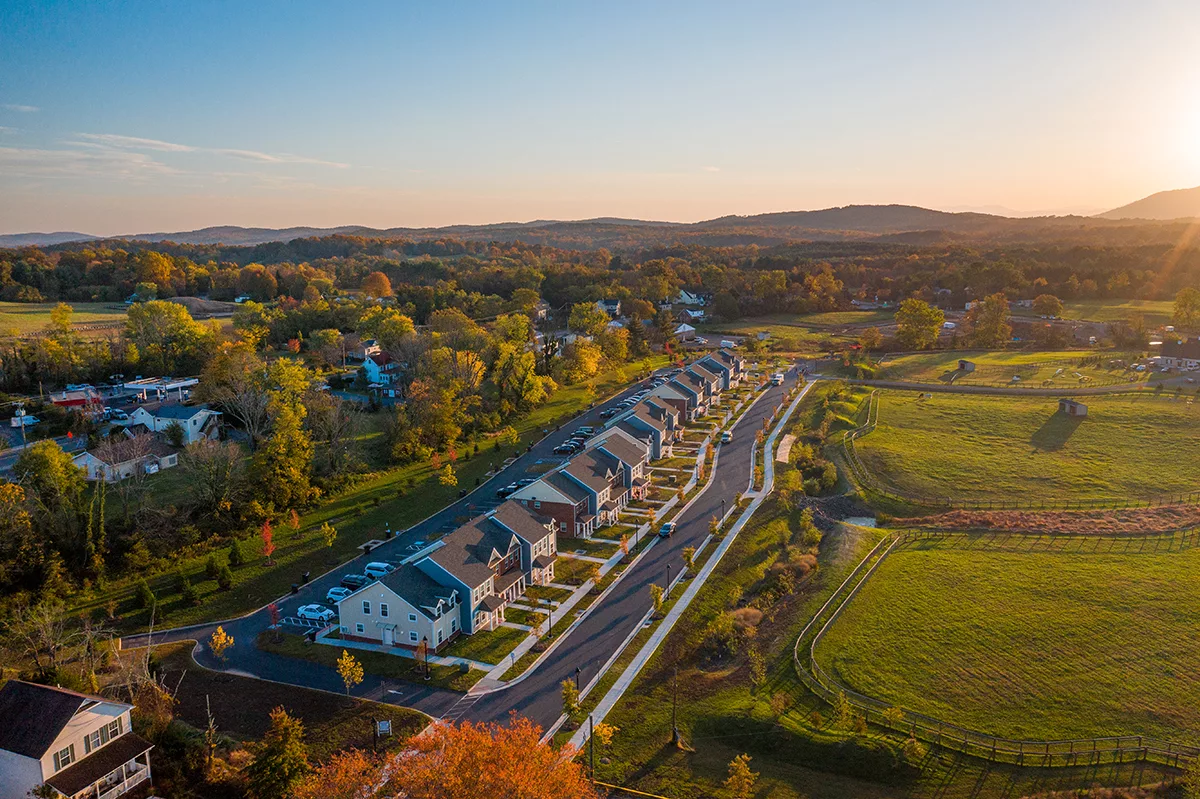This article was featured in the Land Trust Alliance’s publication Breaking Ground: An Affordable Housing Resource Guide for Land Trusts. The Land Trust Alliance recognizes that the intersection between affordable housing and land conservation is an important and rapidly emerging topic. The purpose of this report is to provide a strong foundation for land trusts to gain literacy in the world of affordable housing, while encouraging cross-movement conversation and collaboration.
The Piedmont Environmental Council (PEC), an accredited land trust in central Virginia, straddles nine counties, from the DC suburb of Loudoun County in the north, to the university hub of Albemarle County in the south. In between are miles of rolling countryside with a patchwork of smaller settlements, farms, forests and nature preserves. This breadth makes PEC the second largest land trust in the state, and PEC must be well-versed in issues rural, urban and suburban, like how to protect and manage wildlife habitat, build and fund community gardens, and everything in between.
Increasingly, that has meant advocating for local land use decisions and supporting affordable housing. PEC has formalized this shift in its new five-year strategic plan:
We will advocate for redevelopment, infill, and housing, including affordable housing, in our cities, towns and suburbs to make them more walkable, livable and vibrant. We will challenge development in rural areas that impacts the conservation values we are committed to protect.
This shift, according to PEC’s Senior Advisor and Director of Strategic Partnerships John McCarthy, comes from an increasing realization that “to save the countryside, you have to save the city.” Rural central Virginia is no exception to the Covid-induced migration to rural areas from the country’s urban centers. This exodus has dramatically increased housing pressure in towns and small communities throughout PEC’s service area, pricing longtime residents out of their neighborhoods and creating sprawling housing and commercial developments. In central Virginia, these pressures threaten the farmland, wildlife habitat and waterways that give the region its character and people their livelihoods. Yet, as McCarthy points out, you can’t ignore the pressures of the modern world, nor should you wall your region off to newcomers. The answer, PEC believes, is in advocating for smart growth in connected, livable communities. Redevelopment of existing city land, rezoning, and increasing housing options (both market and affordable) will create dense, walkable communities that continue to make smaller towns attractive and vibrant, while still preserving the surrounding area’s character.

Piedmont Environmental Council, however, is a land trust, not a housing organization. And despite the temptation to jump in and get involved themselves, the board decided instead to take a partnership approach.
“We’ve been involved in land use planning since our beginning, so that wasn’t a huge shift,” McCarthy said. “What was big was the shift into advocating directly for housing. That’s materially different than just conservation.”
To avoid early missteps, PEC sought out partners in its communities that were already advocating for housing and offered its support, however it might be needed. Habitat for Humanity chapters asked for support removing invasive species and building rain gardens. Local housing advocacy organizations asked for support in lobbying and public advocacy. And sometimes it’s just sharing talent. The information technology director of PEC is also the treasurer of the statewide community land trust.
“The best goal for us is to make sure that [community housing organizations] are successful,” McCarthy said. “They need to be shored up, not competed against!”
The land trust has also assigned a staff member to each of PEC’s nine counties who is tasked to “delve into development proposals, zoning, and comprehensive plans to plan for now and the future [with the goal to] improve livability and strengthen communities.”
In many ways, the new language and focus on housing in PEC’s strategic plan is simply an extension of years of community engagement and partnership work. But it also reflects a new emphasis and a willingness to speak publicly about a housing issue that some land trusts have been accused of ignoring. This willingness to engage and support other organizations, rather than take the lead themselves, has already begun to pay dividends.
“We used to be perceived as the party of ‘No’,” said McCarthy. “Now, because we’re lending our voice to these issues, the urban nonprofit community is starting to look at us as a ‘good guy.’ More people understand our mission and are willing to support our work.” That trust and support certainly didn’t grow overnight, and McCarthy cautions that “you need to invest some sweat equity before you can make any sort of ask of your own.” But that hard work has already led to new partnerships, stronger relationships, and renewed trust from the community.
“Trust other organizations to give you good advice,” McCarthy said. You’ll find help from friends you didn’t know you had.
